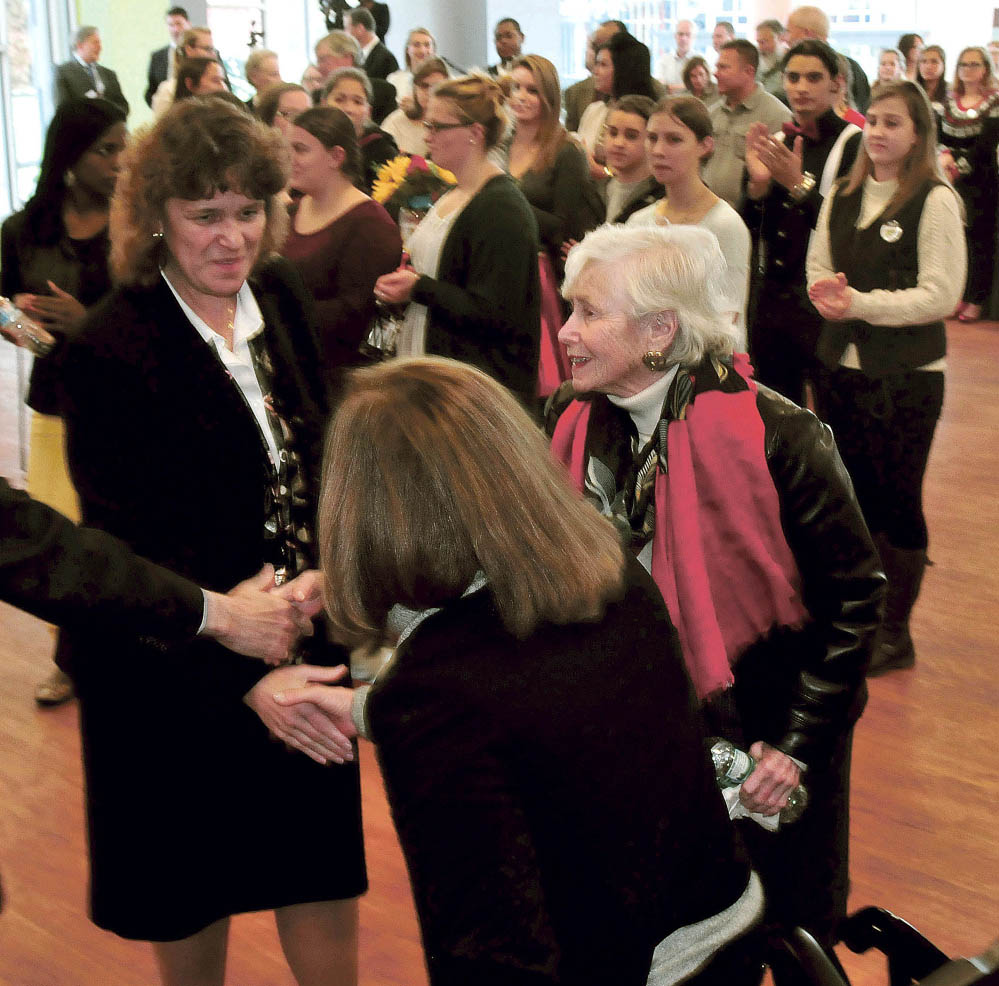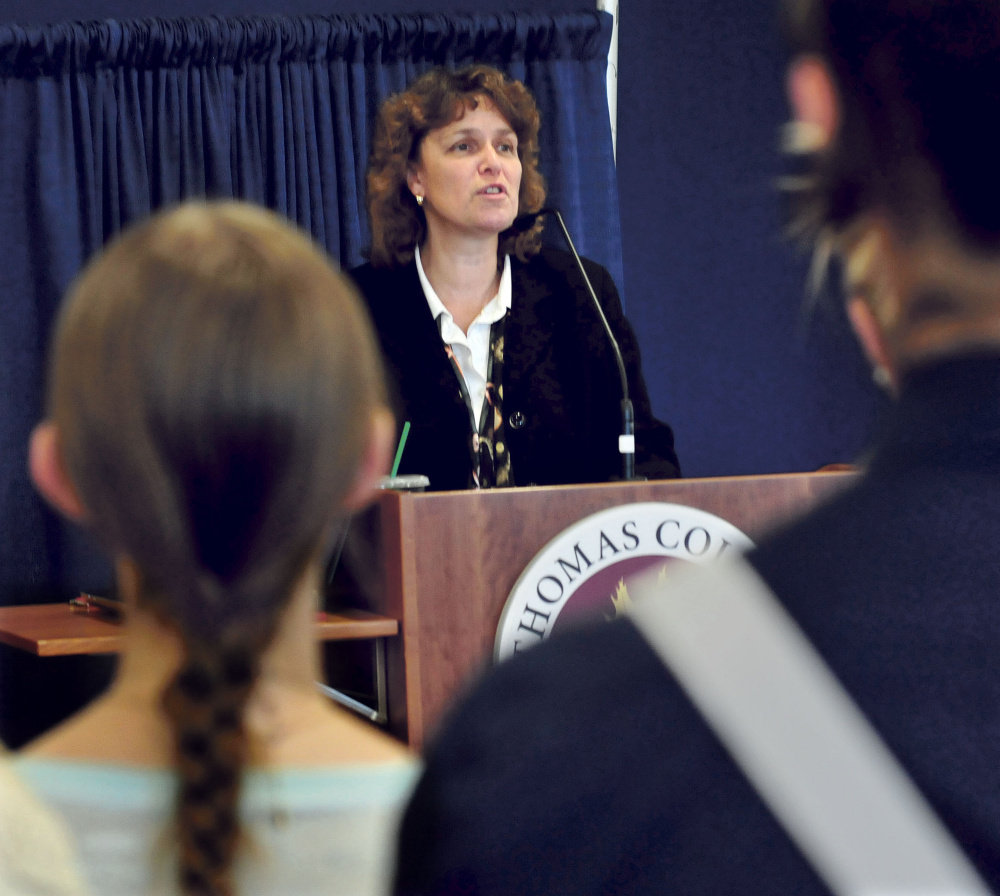WATERVILLE — Thomas College is setting out to be a leader in educating the next generation of teachers with the establishment of its Center for Innovation in Education, which was officially unveiled Tuesday afternoon at a news conference.
With the establishment of the new center — the first of its kind in the state’s higher education system, college officials said Tuesday — the college will refocus its education programs to include teaching proficiency-based learning standards, an emphasis on technology infusion and STEAM (science, technology, engineering, arts and mathematics) methods.
“Our mission is to prepare students for success in their personal and professional lives,” said Thomas College Provost Tom Edwards at the news conference. “The Center for Innovation in Education aligns with this mission.”
Edwards said the college will produce “a new type of teacher” better prepared to adapt to the state’s changing education focus.
The conference, held in the Summit Room of the Spann Student Commons, was attended by faculty and students and featured remarks from Edwards, President Laurie Lachance and Margie Lunder Golby, who spoke on behalf of the Lunder Foundation, which gave the school a grant to fund the program for five years.
The Lunder grant is “significant” and will establish three new faculty positions for the center — one position for each of the focus areas — and make new technology investments that will be infused into their higher education curriculum, officials said yesterday, though the amount of the grant wasn’t made public.
The center will be housed on campus in the Ayotte Academic Building, where several offices were turned into one large room for the center.
College officials said they hope that the center’s establishment will serve as a nexus for education in central Maine. The center and its resources will be available not only to students across a variety of Thomas’ educational disciplines, but also as a professional development tool for teachers already in classrooms in central Maine.
PROFICIENCY-BASED STANDARDS
In 2013, Maine lawmakers passed legislation that sought to begin the conversion from grade-based learning methods to proficiency-based learning in public schools. In a proficiency-based curriculum, new standards supplant traditional grading. Educators and school administrators break down the Maine Learning Results Standards into specific topics and skills. In order for students to progress, they must demonstrate proficiency in the topics.
By 2018, all public high schools in Maine will have to grant diplomas in a proficiency-based system with students not necessarily making it through all four grades of high school, but rather mastering all of the required topics or skills in order to qualify for graduation.
“In response to this mandate, (through the Center for Innovation in Education) Thomas College will produce classroom-ready graduates,” Lachance said.
The state Department of Education has not set strict guidelines for schools to follow. Rather, devising how students will be evaluated under the new systems will be largely left up to the schools and teachers.
Through the center, Thomas students will get a firsthand lesson in how to adapt and chart the education system, officials said Tuesday.
The center also will focus on how to infuse technology into education. Students using the center will have access to new programs and technology such as mobile and hand-held devices, as well as video and recording equipment in an effort to take the idea of a school computer laboratory to the next level, which Lachance called an “educational design center.”
Traditional methods of education teaching have focused largely on the STEM curriculum — science, technology, engineering and mathematics. Another pillar at Thomas’ center will be to expand the model to include the arts — STEAM.
By training education students how to use the modern technology in classrooms to reinforce traditional methods of teaching instruction, Edwards said, Thomas will be “educating a new type of teacher.”
These “new teachers” created through the center will be better prepared to adapt to technological advances that already have been changing how a classroom operates, Edwards said.
‘BETTER PREPARED’
Thomas students Tuesday spoke glowingly of the college’s new focus.
“Given these new pieces of technology, I think we will be better prepared to teach our students,” Nathaniel Thomas, a junior secondary education student, said. “This center will give us the skills and techniques to be able to adapt (to a new teaching environment).”
Michelle Fortier, a junior studying early childhood education, said the center is a way for both Thomas students and people already in the teaching field “to all get connected and get the most out of our education system.”
Hannah Duncan, a sophomore early childhood education student, said that her Educational Psychology course, which is held in the center, is being taught using proficiency-based methods.
“They’re having us experience a proficiency-based education model, and it’s going to be easier to teach something if you’ve experienced learning that way yourself,” she said.
Schools and teachers in central Maine also will be able to use this aspect of the center as a “low-cost” career development tool, Lachance said.
Richard Biffle, a professor of education and anthropology, already has been teaching STEAM methods, which he said blend “qualitative and quantitative methodologies.”
The same legislation that passed proficiency-based learning in 2013 also expanded the areas of proficiency standards that high school students had to complete before graduation.
In 2015, high school graduates had to be proficient in English language arts, mathematics, science and technology, social studies, as well as health and physical education. By 2018, these proficiency requirements will expand to include career and educational development, world languages and visual and performing arts.
By incorporating STEAM methods of teaching into their curriculum, Biffle is confident Thomas College will be graduating students who are well-versed in cross-disciplinary fields of study, creating well-rounded educators, he said.
Several classes already are being taught in the center, but with the addition of three faculty members over the next five years, Edwards expects the curriculum to expand greatly.
He also said visiting speakers and workshops already are being coordinated through the center.
Lauren Abbate — 861-9252
Twitter: @Lauren_M_Abbate
Send questions/comments to the editors.



